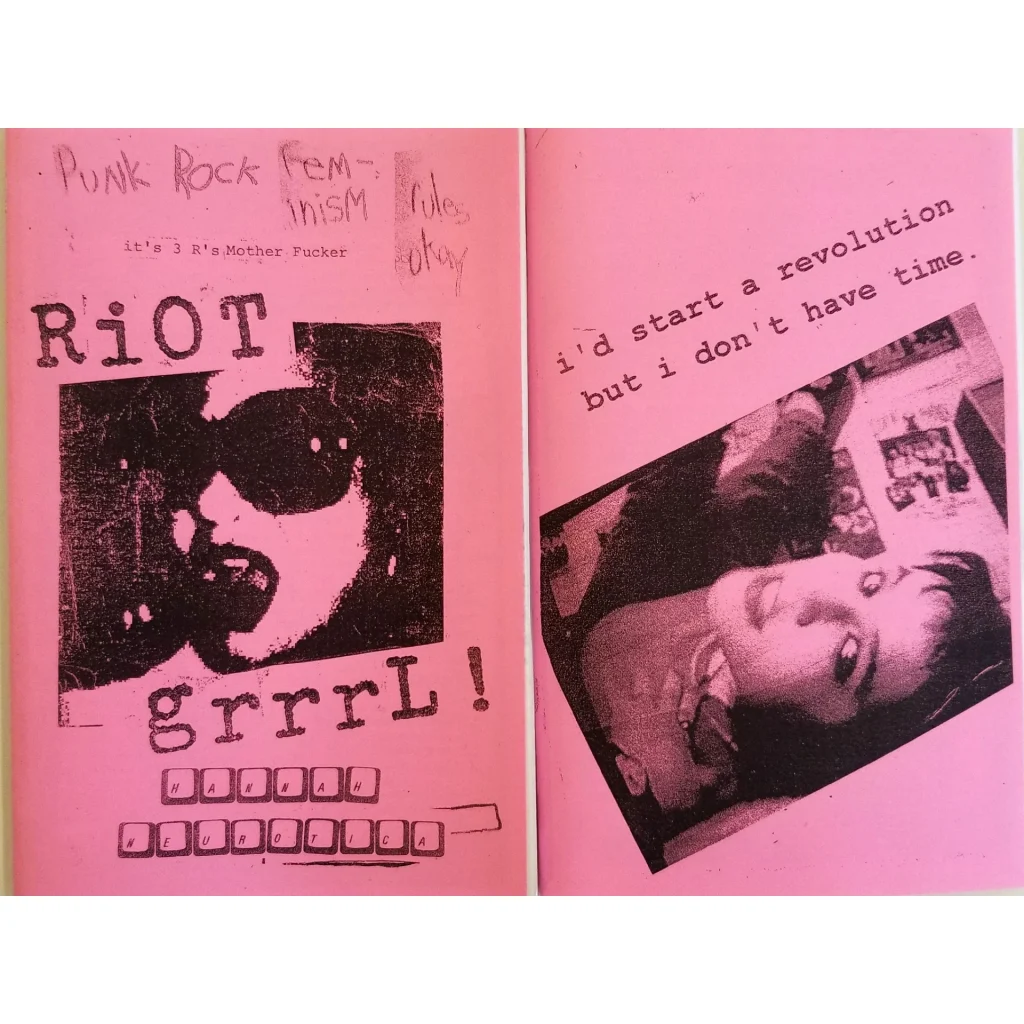
The rise of the riot grrrl movement can be traced to musicians and zine creators Tobi Vail, Allison Wolfe, Molly Neuman, and Kathleen Hanna–founders of the bands Bratmobile and Bikini Kill, respectively. From its inception, riot grrrl was ideologically rooted in the concept of a girl-led collective and actively resisted the elevation of individual figureheads. Instead, its founders encouraged young women to create their own music, art, writing, and forms of protest. This DIY ethos empowered those who had never played an instrument or written creatively to pick up guitars or pens and express themselves. Women punk enthusiasts crafted fanzines that quickly evolved into interactive platforms for radical political dialogue and genre-defying creative expression by self-identified riot grrrls, fostering a vibrant culture of subversion and solidarity.


Through their music and textual productions, riot grrrls launched a pointed critique of capitalism and consumer culture while foregrounding feminist issues such as rape, assault, and the physical and psychological abuse of women. Riot grrrl zines frequently featured confessional autofiction, satirical graphic art, exchanges between creators and readers, and discussions of gender and emerging queer theory. This loosely connected, nomadic community, typically composed of individuals between the ages of 13 and 25, often experienced marginalization and alienation from the mainstream cultures in which they lived. Zines played a critical mediating role, facilitating consciousness-raising encounters between writers and readers that transcended regional and national boundaries. These exchanges fostered a sense of intimate solidarity–or, in riot grrrl terms, “girl love”–among participants. The movement’s emphasis on revealing lived, personal experience as a marker of authenticity echoes strands of second-wave feminism, particularly those that championed realistic and autobiographical writing as key tools for feminist consciousness-raising.

As Bikini Kill’s Kathleen Hanna explains,
“In writing [zines], I have had to think a lot about how to share information without acting all bossy or being condescending. … Just cuz I’m an addict/alcoholic (what-fuckin-evah) doesn’t mean I think I can speak for everyone in terms of addiction. It seems to me that each addict functions within his/her own context in terms of race, gender, location, class, personality, access, etc. . . . So it would be ridiculous for me to try and write a ‘manifesto’ or a ‘universal account’ of how addiction works.”

Here, Hanna anticipates and pre-empts external critique that she speaks from a privileged, universalist position as a white woman. Crucially, however, this acknowledgement follows her revelation of personal experience—and indeed, her claimed expertise—regarding addiction. The culture of privilege-checking cultivated in riot grrrl zines, while rooted in a desire for accountability and inclusivity, gives rise to what Mimi Thi Nguyen (2012) describes as a “troubling politics”. In this framework, traumatic experience—when reframed as the product of systemic oppression—serves to bolster claims of authentic marginality, effectively translating lived experience into a form of expertise. This dynamic complicates the relationship between personal narrative, political authority, and identity within the riot grrrl movement.
This according to “Killing ourselves is not subversive: Riot grrrl from zine to screen and the commodification of female transgression” by Emily Spiers (Women: A cultural review 26/1-2 [2015] 1–21; RILM Abstracts with Full Text, 2015-83472).
In the video below, zine publishers and artists describe riot grrrl (and zines in particular) as their entry point to different forms of activism and expression in the 1990s–the video was part of the Alien she exhibition at the Yerba Buena Center for the Arts in San Francisco.
Related Bibliolore post:
https://bibliolore.org/2019/06/10/riot-grrrl-and-feminism/
https://bibliolore.org/2018/05/17/queercore-and-all-girl-bands/
https://bibliolore.org/2024/05/07/laura-jane-grace-sings-the-gender-dysphoria-blues/









